The Cambridge History of China. Vol. 12: Republican China, 1912-1949, Part 1
Подождите немного. Документ загружается.

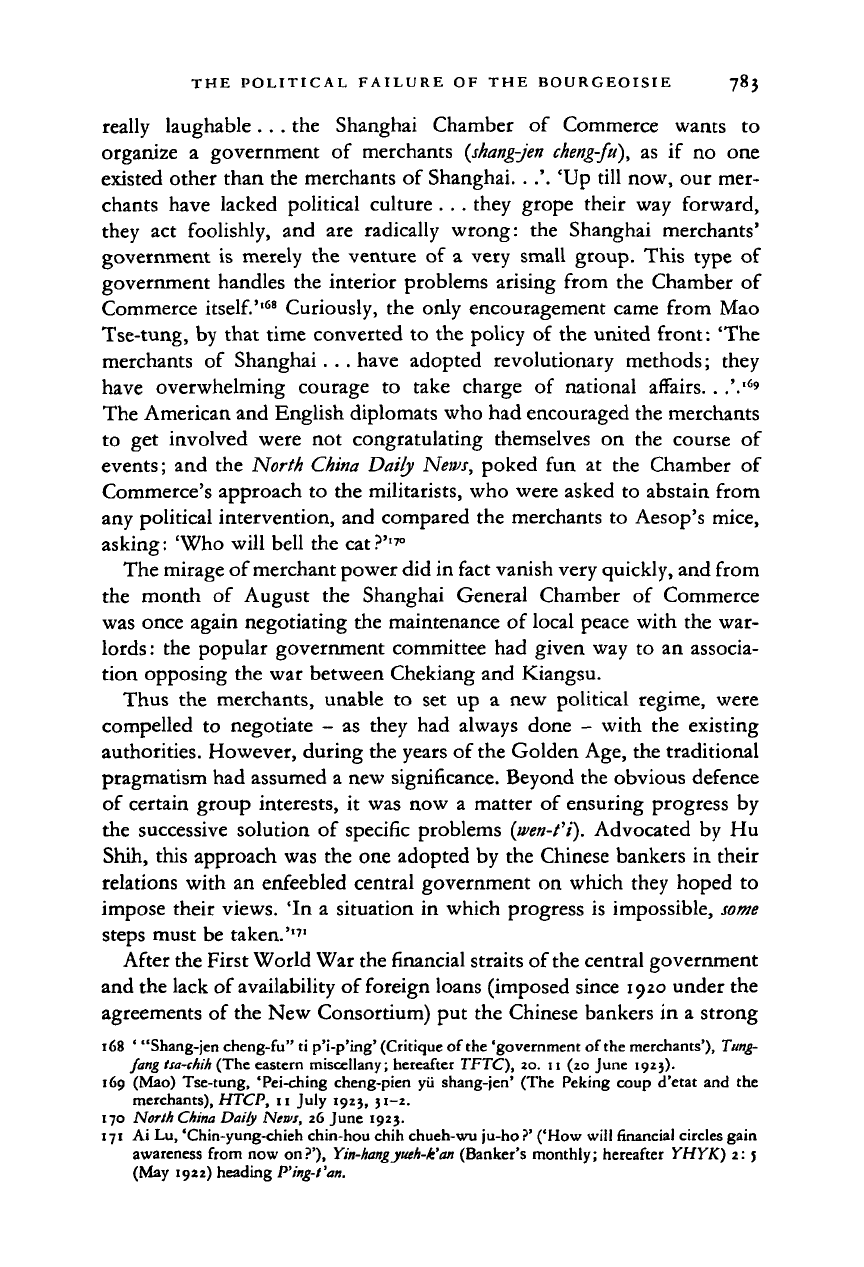
THE POLITICAL FAILURE OF THE BOURGEOISIE 783
really laughable. . . the Shanghai Chamber of Commerce wants to
organize a government of merchants
{shang-jen
cheng-fu),
as if no one
existed other than the merchants of Shanghai. . .'. 'Up till now, our mer-
chants have lacked political culture . . . they grope their way forward,
they act foolishly, and are radically wrong: the Shanghai merchants'
government is merely the venture of a very small group. This type of
government handles the interior problems arising from the Chamber of
Commerce
itself.'
168
Curiously, the only encouragement came from Mao
Tse-tung, by that time converted to the policy of the united front: 'The
merchants of Shanghai. . . have adopted revolutionary methods; they
have overwhelming courage to take charge of national affairs. . ,'.'
69
The American and English diplomats who had encouraged the merchants
to get involved were not congratulating themselves on the course of
events; and the North
China
Daily News, poked fun at the Chamber of
Commerce's approach to the militarists, who were asked to abstain from
any political intervention, and compared the merchants to Aesop's mice,
asking: 'Who will bell the cat?'
1
?
0
The mirage of merchant power did in fact vanish very quickly, and from
the month of August the Shanghai General Chamber of Commerce
was once again negotiating the maintenance of local peace with the war-
lords:
the popular government committee had given way to an associa-
tion opposing the war between Chekiang and Kiangsu.
Thus the merchants, unable to set up a new political regime, were
compelled to negotiate - as they had always done - with the existing
authorities. However, during the years of the Golden Age, the traditional
pragmatism had assumed a new significance. Beyond the obvious defence
of certain group interests, it was now a matter of ensuring progress by
the successive solution of specific problems (wen-t'i). Advocated by Hu
Shih, this approach was the one adopted by the Chinese bankers in their
relations with an enfeebled central government on which they hoped to
impose their views. 'In a situation in which progress is impossible,
some
steps must be taken.'"
7
'
After the First World War the financial straits of
the
central government
and the lack of availability of foreign loans (imposed since 1920 under the
agreements of the New Consortium) put the Chinese bankers in a strong
168 ' "Shang-jen cheng-fu" ti p'i-p'ing' (Critique of the 'government of the merchants'),
Tung-
fang
tsa-chih
(The eastern miscellany; hereafter TFTC), 20. 11 (20 June 1925).
169 (Mao) Tse-tung, 'Pei-ching cheng-pien yii shang-jen' (The Peking coup d'etat and the
merchants), HTCP, 11 July 1923, 31-2.
170 North
China
Daily News, 26 June 1923.
171 Ai Lu, 'Chin-yung-chieh chin-hou chih chueh-wu ju-ho
?'
('How will financial circles gain
awareness from now on?'), Yin-hang yueh-k'an (Banker's monthly; hereafter YHYK) 2: $
(May 1922) heading P'ing-t'an.
Cambridge Histories Online © Cambridge University Press, 2008
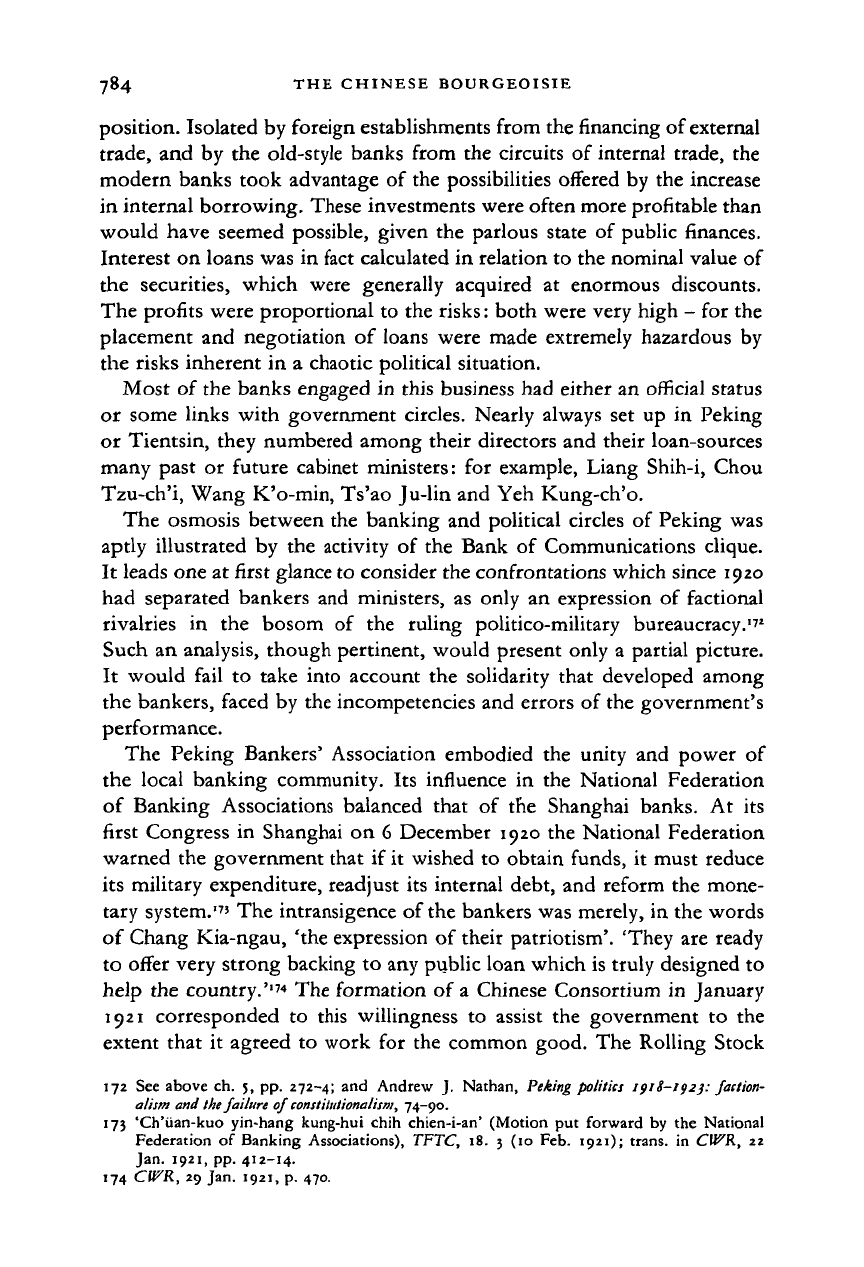
784 THE CHINESE BOURGEOISIE
position. Isolated
by
foreign establishments from
the
financing
of
external
trade,
and by the
old-style banks from
the
circuits
of
internal trade,
the
modern banks took advantage
of the
possibilities offered
by the
increase
in internal borrowing. These investments were often more profitable than
would have seemed possible, given
the
parlous state
of
public finances.
Interest
on
loans
was in
fact calculated
in
relation
to the
nominal value
of
the securities, which were generally acquired
at
enormous discounts.
The profits were proportional
to the
risks: both were very high
-
for the
placement
and
negotiation
of
loans were made extremely hazardous
by
the risks inherent
in
a
chaotic political situation.
Most
of the
banks engaged
in
this business
had
either
an
official status
or some links with government circles. Nearly always
set up
in
Peking
or Tientsin, they numbered among their directors
and
their loan-sources
many past
or
future cabinet ministers:
for
example, Liang Shih-i, Chou
Tzu-ch'i, Wang K'o-min, Ts'ao Ju-lin
and Yeh
Kung-ch'o.
The osmosis between
the
banking
and
political circles
of
Peking
was
aptly illustrated
by
the
activity
of
the
Bank
of
Communications clique.
It leads
one at
first glance
to
consider
the
confrontations which since
1920
had separated bankers
and
ministers,
as
only
an
expression
of
factional
rivalries
in the
bosom
of the
ruling politico-military bureaucracy.
172
Such
an
analysis, though pertinent, would present only
a
partial picture.
It would fail
to
take into account
the
solidarity that developed among
the bankers, faced
by the
incompetencies
and
errors
of the
government's
performance.
The Peking Bankers' Association embodied
the
unity
and
power
of
the local banking community.
Its
influence
in
the
National Federation
of Banking Associations balanced that
of
the
Shanghai banks.
At its
first Congress
in
Shanghai
on 6
December
1920 the
National Federation
warned
the
government that
if
it
wished
to
obtain funds,
it
must reduce
its military expenditure, readjust
its
internal debt,
and
reform
the
mone-
tary system.'
75
The
intransigence
of
the bankers
was
merely,
in the
words
of Chang Kia-ngau,
'the
expression
of
their patriotism'. 'They
are
ready
to offer very strong backing
to any
public loan which
is
truly designed
to
help
the
country.'
174
The
formation
of a
Chinese Consortium
in
January
1921 corresponded
to
this willingness
to
assist
the
government
to
the
extent that
it
agreed
to
work
for the
common good.
The
Rolling Stock
172 See above ch.
5,
pp. 272-4;
and
Andrew
J.
Nathan, Peking politics 1918-192): faction-
alism and the failure of
constitutionalism,
74-90.
173 "Ch'iian-kuo yin-hang kung-hui chih chien-i-an' (Motion
put
forward
by the
National
Federation
of
Banking Associations), TFTC,
18. 3 (10
Feb. 1921); trans,
in
CWK
t
22
Jan. 1921, pp. 412-14.
174 CWR, 29 Jan. 1921, p. 470.
Cambridge Histories Online © Cambridge University Press, 2008
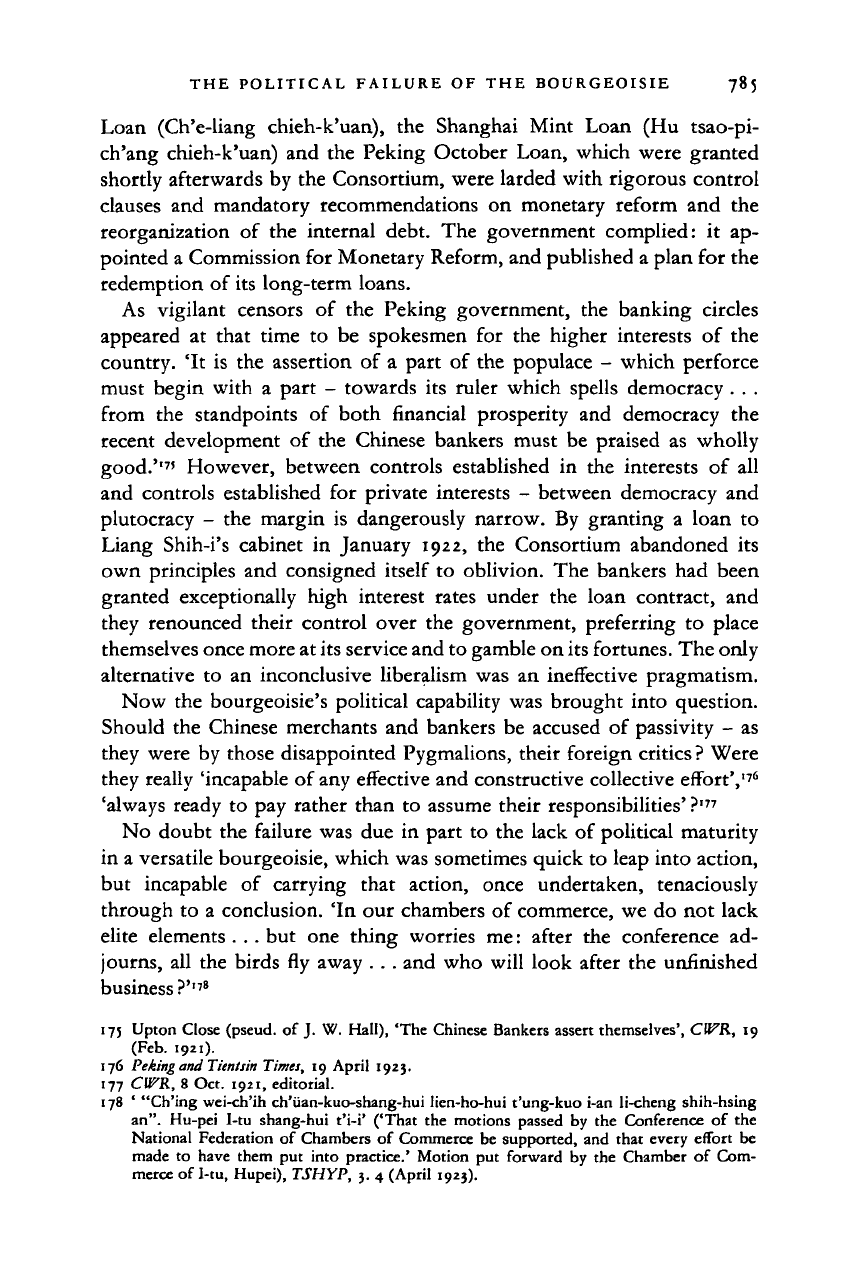
THE POLITICAL FAILURE OF THE BOURGEOISIE 785
Loan (Ch'e-liang chieh-k'uan), the Shanghai Mint Loan (Hu tsao-pi-
ch'ang chieh-k'uan) and the Peking October Loan, which were granted
shortly afterwards by the Consortium, were larded with rigorous control
clauses and mandatory recommendations on monetary reform and the
reorganization of the internal debt. The government complied: it ap-
pointed a Commission for Monetary Reform, and published a plan for the
redemption of its long-term loans.
As vigilant censors of the Peking government, the banking circles
appeared at that time to be spokesmen for the higher interests of the
country. 'It is the assertion of a part of the populace - which perforce
must begin with a part - towards its ruler which spells democracy . . .
from the standpoints of both financial prosperity and democracy the
recent development of the Chinese bankers must be praised as wholly
good.'
17
' However, between controls established in the interests of all
and controls established for private interests - between democracy and
plutocracy - the margin is dangerously narrow. By granting a loan to
Liang Shih-i's cabinet in January 1922, the Consortium abandoned its
own principles and consigned itself to oblivion. The bankers had been
granted exceptionally high interest rates under the loan contract, and
they renounced their control over the government, preferring to place
themselves once more at its service and to gamble on its fortunes. The only
alternative to an inconclusive liberalism was an ineffective pragmatism.
Now the bourgeoisie's political capability was brought into question.
Should the Chinese merchants and bankers be accused of passivity - as
they were by those disappointed Pygmalions, their foreign critics
?
Were
they really 'incapable of any effective and constructive collective effort','
76
'always ready to pay rather than to assume their responsibilities' ?
177
No doubt the failure was due in part to the lack of political maturity
in a versatile bourgeoisie, which was sometimes quick to leap into action,
but incapable of carrying that action, once undertaken, tenaciously
through to a conclusion. 'In our chambers of commerce, we do not lack
elite elements . .. but one thing worries me: after the conference ad-
journs, all the birds fly away . . . and who will look after the unfinished
business ?'"
8
175 Upton Close (pseud, of J. W. Hall), 'The Chinese Bankers assert themselves', CWK, 19
(Feb.
1921).
176
Peking
and
Tientsin
Times, 19 April 1923.
177 CWR, 8 Oct. 1921, editorial.
178 ' "Ch'ing wei-ch'ih ch'iian-kuo-shang-hui lien-ho-hui t'ung-kuo i-an li-cheng shih-hsing
an".
Hu-pei I-tu shang-hui t'i-i' ('That the motions passed by the Conference of the
National Federation of Chambers of Commerce be supported, and that every effort be
made to have them put into practice.' Motion put forward by the Chamber of Com-
merce of I-tu, Hupei), TSHYP, 3. 4 (April 1923).
Cambridge Histories Online © Cambridge University Press, 2008
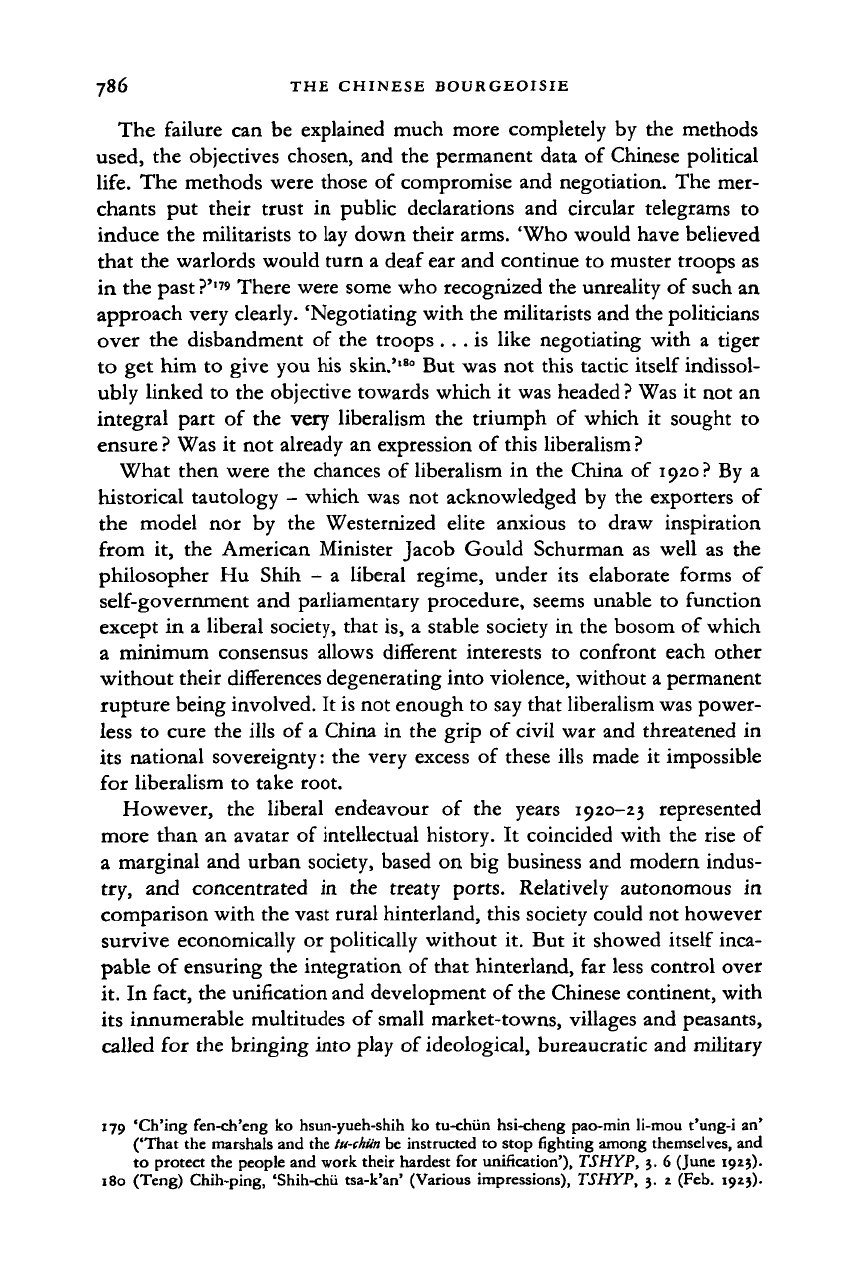
786 THE CHINESE BOURGEOISIE
The failure can be explained much more completely by the methods
used, the objectives chosen, and the permanent data of Chinese political
life.
The methods were those of compromise and negotiation. The mer-
chants put their trust in public declarations and circular telegrams to
induce the militarists to lay down their arms. 'Who would have believed
that the warlords would turn a deaf ear and continue to muster troops as
in the past ?'
179
There were some who recognized the unreality of such an
approach very clearly. 'Negotiating with the militarists and the politicians
over the disbandment of the troops ... is like negotiating with a tiger
to get him to give you his skin.'
180
But was not this tactic itself indissol-
ubly linked to the objective towards which it was headed
?
Was it not an
integral part of the very liberalism the triumph of which it sought to
ensure
?
Was it not already an expression of this liberalism
?
What then were the chances of liberalism in the China of
1920 ?
By a
historical tautology - which was not acknowledged by the exporters of
the model nor by the Westernized elite anxious to draw inspiration
from it, the American Minister Jacob Gould Schurman as well as the
philosopher Hu Shih - a liberal regime, under its elaborate forms of
self-government and parliamentary procedure, seems unable to function
except in a liberal society, that is, a stable society in the bosom of which
a minimum consensus allows different interests to confront each other
without their differences degenerating into violence, without a permanent
rupture being involved. It is not enough to say that liberalism was power-
less to cure the ills of a China in the grip of civil war and threatened in
its national sovereignty: the very excess of these ills made it impossible
for liberalism to take root.
However, the liberal endeavour of the years 1920-23 represented
more than an avatar of intellectual history. It coincided with the rise of
a marginal and urban society, based on big business and modern indus-
try, and concentrated in the treaty ports. Relatively autonomous in
comparison with the vast rural hinterland, this society could not however
survive economically or politically without it. But it showed itself inca-
pable of ensuring the integration of that hinterland, far less control over
it. In fact, the unification and development of the Chinese continent, with
its innumerable multitudes of small market-towns, villages and peasants,
called for the bringing into play of ideological, bureaucratic and military
179 'Ch'ing fen-ch'eng ko hsun-yueh-shih ko tu-chiin hsi-cheng pao-min li-mou t'ung-i an*
("That the marshals and the
tu-chiin
be instructed to stop fighting among themselves, and
to protect the people and work their hardest for unification'), TSHYP, 3. 6 (June 1925).
180 (Teng) Chih-ping, 'Shih-chii tsa-k'an' (Various impressions), TSHYP, 3. 2 (Feb. 1923).
Cambridge Histories Online © Cambridge University Press, 2008
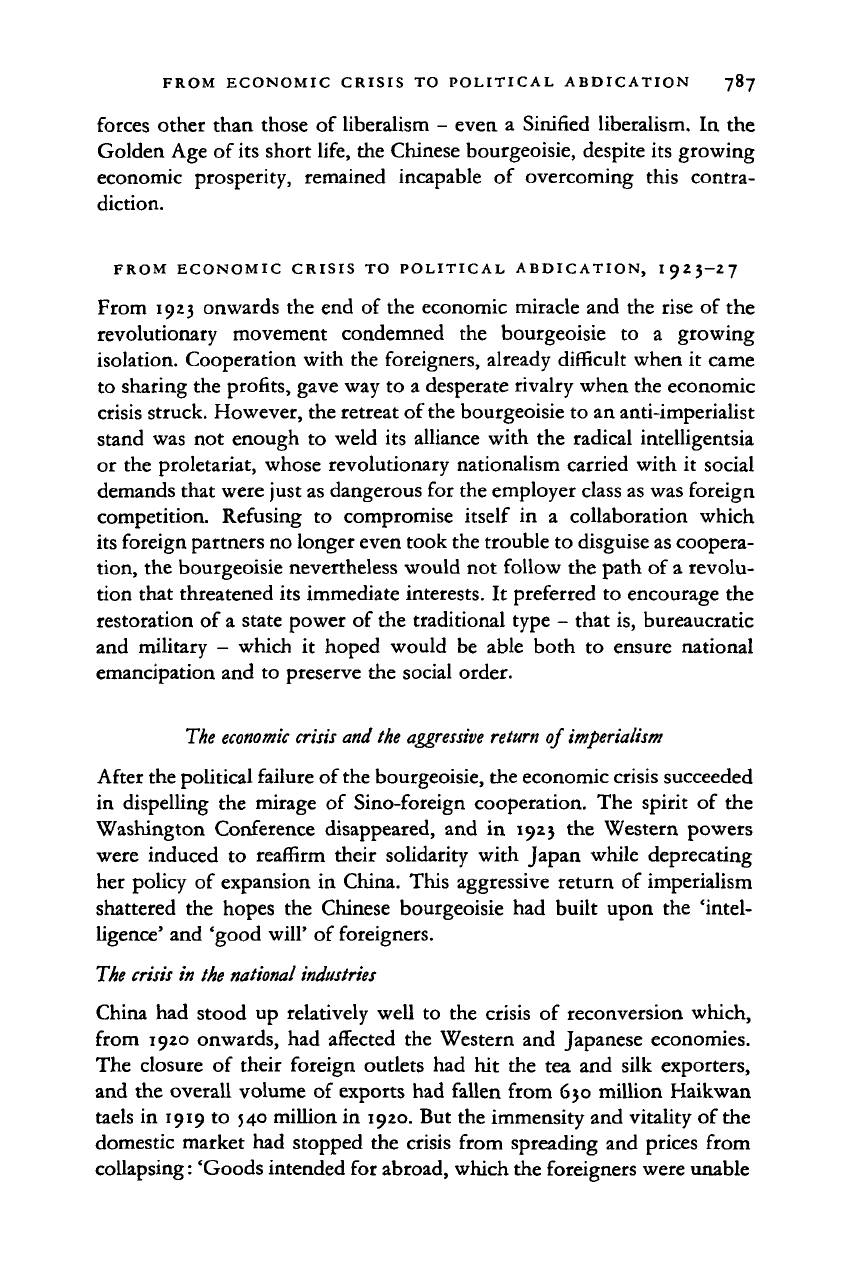
FROM ECONOMIC CRISIS TO POLITICAL ABDICATION 787
forces other than those of liberalism - even a Sinified liberalism. In the
Golden Age of its short life, the Chinese bourgeoisie, despite its growing
economic prosperity, remained incapable of overcoming this contra-
diction.
FROM ECONOMIC CRISIS TO POLITICAL ABDICATION, I923-27
From 1923 onwards the end of the economic miracle and the rise of the
revolutionary movement condemned the bourgeoisie to a growing
isolation. Cooperation with the foreigners, already difficult when it came
to sharing the profits, gave way to a desperate rivalry when the economic
crisis struck. However, the retreat of
the
bourgeoisie to an anti-imperialist
stand was not enough to weld its alliance with the radical intelligentsia
or the proletariat, whose revolutionary nationalism carried with it social
demands that were just as dangerous for the employer class as was foreign
competition. Refusing to compromise itself in a collaboration which
its foreign partners no longer even took the trouble to disguise as coopera-
tion, the bourgeoisie nevertheless would not follow the path of a revolu-
tion that threatened its immediate interests. It preferred to encourage the
restoration of a state power of the traditional type - that is, bureaucratic
and military - which it hoped would be able both to ensure national
emancipation and to preserve the social order.
The
economic
crisis and the
aggressive
return of imperialism
After the political failure of
the
bourgeoisie, the economic crisis succeeded
in dispelling the mirage of Sino-foreign cooperation. The spirit of the
Washington Conference disappeared, and in 1923 the Western powers
were induced to reaffirm their solidarity with Japan while deprecating
her policy of expansion in China. This aggressive return of imperialism
shattered the hopes the Chinese bourgeoisie had built upon the 'intel-
ligence' and 'good will' of foreigners.
The crisis in the national industries
China had stood up relatively well to the crisis of reconversion which,
from 1920 onwards, had affected the Western and Japanese economies.
The closure of their foreign outlets had hit the tea and silk exporters,
and the overall volume of exports had fallen from 630 million Haikwan
taels in 1919 to 540 million in 1920. But the immensity and vitality of the
domestic market had stopped the crisis from spreading and prices from
collapsing: 'Goods intended for abroad, which the foreigners were unable
Cambridge Histories Online © Cambridge University Press, 2008
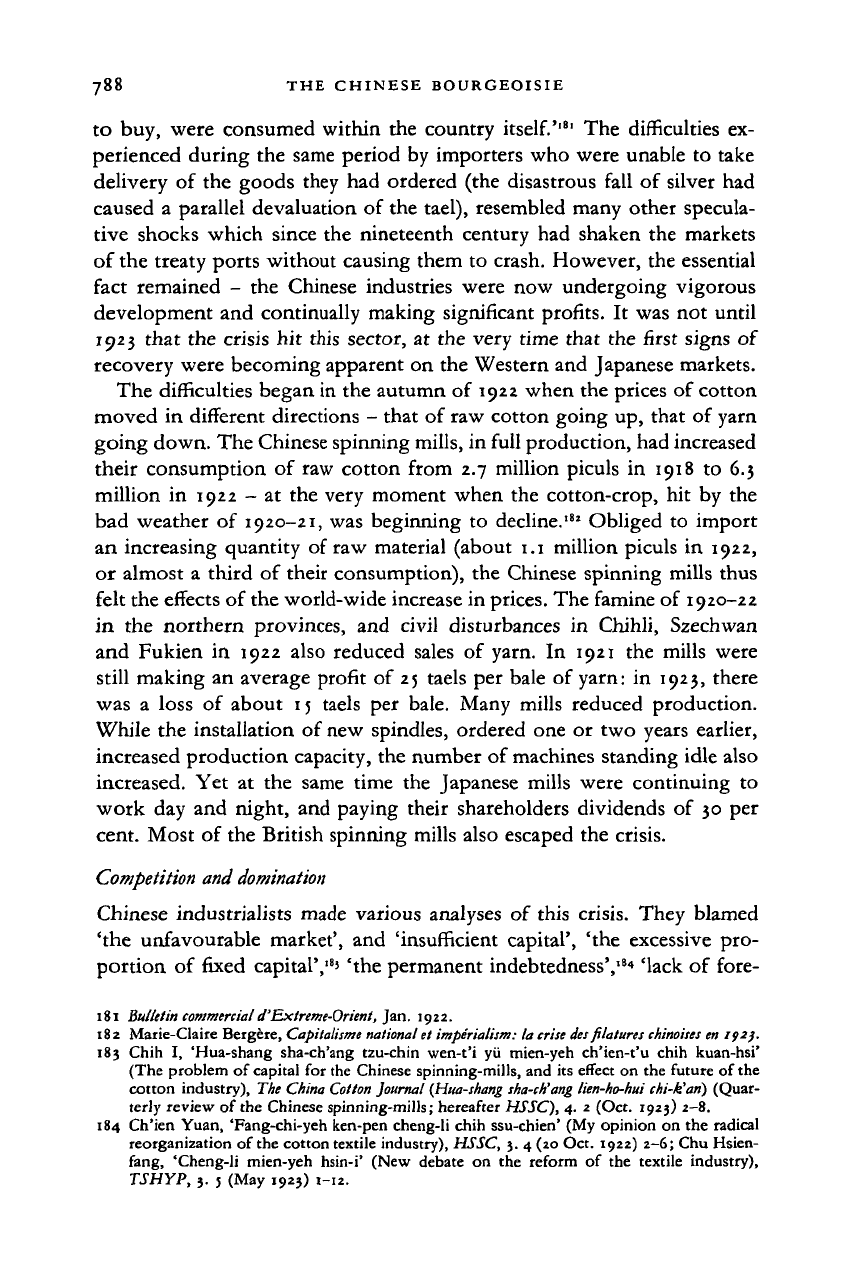
788 THE CHINESE BOURGEOISIE
to
buy,
were consumed within
the
country
itself.'
18
'
The
difficulties
ex-
perienced during
the
same period
by
importers
who
were unable
to
take
delivery
of
the
goods they
had
ordered
(the
disastrous fall
of
silver
had
caused
a
parallel devaluation
of
the tael), resembled many other specula-
tive shocks which since
the
nineteenth century
had
shaken
the
markets
of the treaty ports without causing them
to
crash. However,
the
essential
fact remained
- the
Chinese industries were
now
undergoing vigorous
development
and
continually making significant profits.
It
was not
until
1923 that
the
crisis
hit
this sector,
at
the
very time that
the
first signs
of
recovery were becoming apparent
on the
Western
and
Japanese markets.
The difficulties began in
the
autumn
of
1922 when
the
prices
of
cotton
moved
in
different directions
-
that
of
raw cotton going
up,
that
of
yarn
going down. The Chinese spinning mills,
in
full production, had increased
their consumption
of
raw
cotton from
2.7
million piculs
in
1918
to 6.3
million
in
1922
- at
the
very moment when
the
cotton-crop,
hit
by the
bad weather
of
1920-21,
was
beginning
to
decline.'
82
Obliged
to
import
an increasing quantity
of
raw material (about
1.1
million piculs
in
1922,
or almost
a
third
of
their consumption),
the
Chinese spinning mills thus
felt the effects
of
the world-wide increase
in
prices. The famine
of
1920-22
in
the
northern provinces,
and
civil disturbances
in
Chihli, Szechwan
and Fukien
in
1922
also reduced sales
of
yarn.
In
1921 the
mills were
still making
an
average profit
of
25 taels
per
bale
of
yarn:
in
1925, there
was
a
loss
of
about
15
taels
per
bale. Many mills reduced production.
While
the
installation
of
new spindles, ordered
one
or
two
years earlier,
increased production capacity,
the
number
of
machines standing idle also
increased.
Yet
at
the
same time
the
Japanese mills were continuing
to
work
day and
night,
and
paying their shareholders dividends
of
30 per
cent. Most
of
the British spinning mills also escaped
the
crisis.
Competition and domination
Chinese industrialists made various analyses
of
this crisis. They blamed
'the unfavourable market',
and
'insufficient capital',
'the
excessive
pro-
portion
of
fixed capital',"'
'the
permanent indebtedness',
18
" 'lack
of
fore-
181 Bulletin
commercial
d'Extreme-Orient,
Jan. 1922.
182 Marie-Claire Bergere, Capitalisms
national el
imperialism: la
crise
des filatures
chinoises en
192).
183 Chih
I,
'Hua-shang sha-ch'ang tzu-chin wen-t'i
yii
mien-yeh ch'ien-t'u chih kuan-hsi'
(The problem
of
capital
for the
Chinese spinning-mills,
and its
effect
on the
future
of the
cotton industry),
The
China Cotton Journal
{Hua-shang sha-ch'ang lien-ho-hui
chi-k'an) (Quar-
terly review
of
the Chinese spinning-mills; hereafter HSSC),
4.
2 (Oct. 1923) 2-8.
184 Ch'ien Yuan, 'Fang-chi-yeh ken-pen cheng-li chih ssu-chien' (My opinion
on the
radical
reorganization
of
the cotton textile industry), HSSC, 3.
4
(20 Oct. 1922) 2-6; Chu Hsien-
fang,
'Cheng-li mien-yeh hsin-i'
(New
debate
on the
reform
of the
textile industry),
TSHYP,
3.
5 (May 1923)
t
-i2.
Cambridge Histories Online © Cambridge University Press, 2008
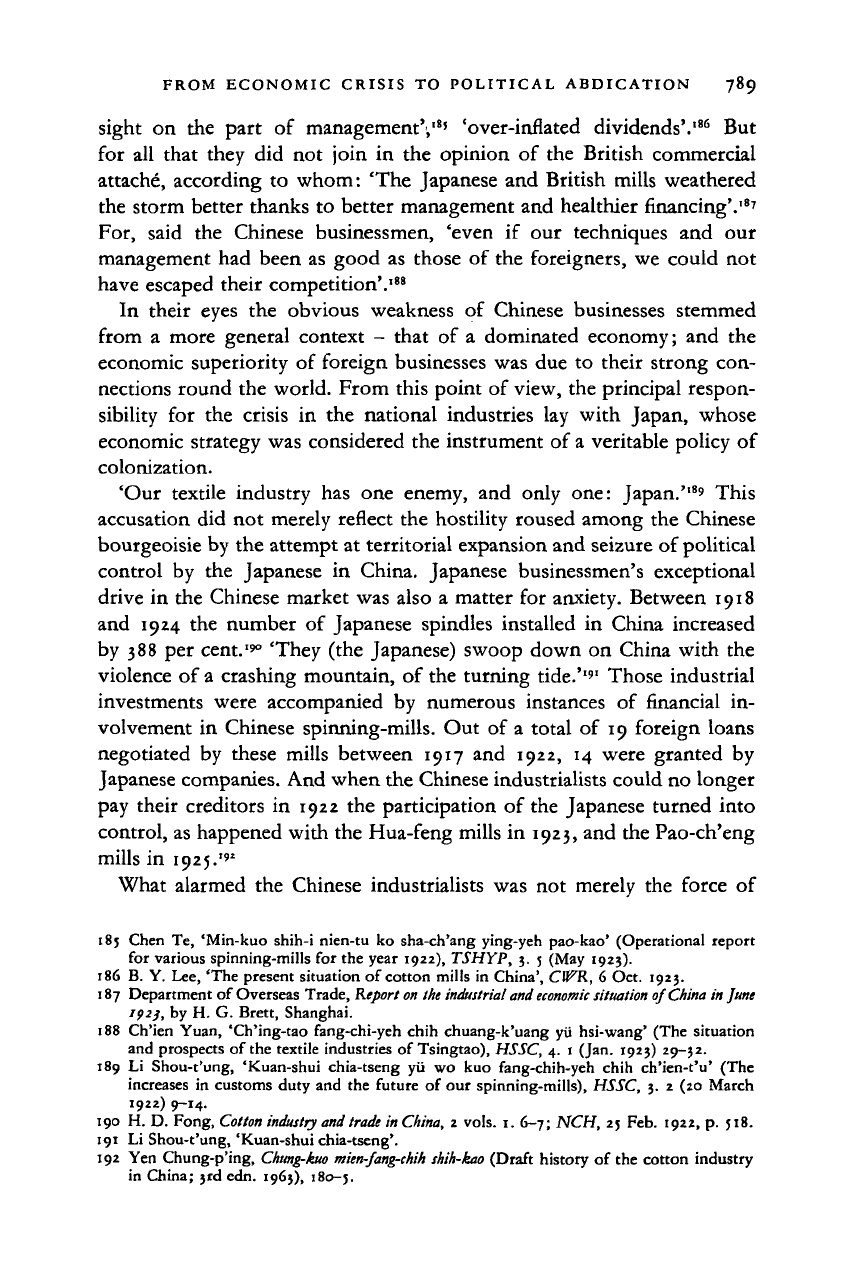
FROM ECONOMIC CRISIS TO POLITICAL ABDICATION 789
sight
on the
part
of
management',
18
' 'over-inflated dividends'.
186
But
for
all
that they
did not
join
in
the
opinion
of
the
British commercial
attache, according
to
whom:
'The
Japanese
and
British mills weathered
the storm better thanks
to
better management
and
healthier financing'.
1
'
7
For, said
the
Chinese businessmen, 'even
if our
techniques
and our
management
had
been
as
good
as
those
of
the
foreigners,
we
could
not
have escaped their competition'.
188
In their eyes
the
obvious weakness
of
Chinese businesses stemmed
from
a
more general context
-
that
of a
dominated economy;
and
the
economic superiority
of
foreign businesses
was due
to
their strong
con-
nections round
the
world. From this point
of
view,
the
principal respon-
sibility
for the
crisis
in the
national industries
lay
with Japan, whose
economic strategy
was
considered
the
instrument
of
a veritable policy
of
colonization.
'Our textile industry
has one
enemy,
and
only
one:
Japan."
8
' This
accusation
did not
merely reflect
the
hostility roused among
the
Chinese
bourgeoisie
by the
attempt
at
territorial expansion
and
seizure
of
political
control
by the
Japanese
in
China. Japanese businessmen's exceptional
drive
in
the
Chinese market
was
also
a
matter
for
anxiety. Between
1918
and
1924
the
number
of
Japanese spindles installed
in
China increased
by
388 per
cent.
190
'They
(the
Japanese) swoop down
on
China with
the
violence
of
a crashing mountain,
of
the
turning tide.'
1
'
1
Those industrial
investments were accompanied
by
numerous instances
of
financial
in-
volvement
in
Chinese spinning-mills.
Out
of
a
total
of
19
foreign loans
negotiated
by
these mills between
1917
and
1922, 14
were granted
by
Japanese companies.
And
when the Chinese industrialists could
no
longer
pay their creditors
in
1922 the
participation
of
the
Japanese turned into
control,
as
happened with
the
Hua-feng mills
in
1923,
and the
Pao-ch'eng
mills
in
1925.
192
What alarmed
the
Chinese industrialists
was
not
merely
the
force
of
185 Chen
Te,
'Min-kuo shih-i nien-tu
ko
sha-ch'ang ying-yeh pao-kao' (Operational report
for various spinning-mills
for
the year 1922), TSHYP,
3.
5 (May 1923).
186
B. Y.
Lee, 'The present situation
of
cotton mills
in
China',
CWR, 6
Oct. 1923.
187
Department
of
Overseas Trade, Report
on
the industrial and
economic situation
of China in
June
192),
by H. G.
Brett, Shanghai.
188 Ch'ien Yuan, 'Ch'ing-tao fang-chi-yeh chih chuang-k'uang
yii
hsi-wang' (The situation
and prospects
of
the textile industries
of
Tsingtao), HSSC,
4.
1 (Jan. 1923) 29-32.
189
Li
Shou-t'ung, 'Kuan-shui chia-tseng
yii wo kuo
fang-chih-yeh chih ch'ien-t'u'
(The
increases
in
customs duty
and the
future
of
our spinning-mills), HSSC,
3. 2 (20
March
1922) 9-14.
190
H. D.
Fong,
Cotton industry
and
trade
in
China,
2
vols.
1.
6-7;
NCH,
25 Feb. 1922,
p.
518.
191
Li
Shou-t'ung, 'Kuan-shui chia-tseng'.
192
Yen
Chung-p'ing,
Chung-kuo mien-fang-chih shih-kao
(Draft history
of
the cotton industry
in China; 3rd edn. 1963), 180-5.
Cambridge Histories Online © Cambridge University Press, 2008
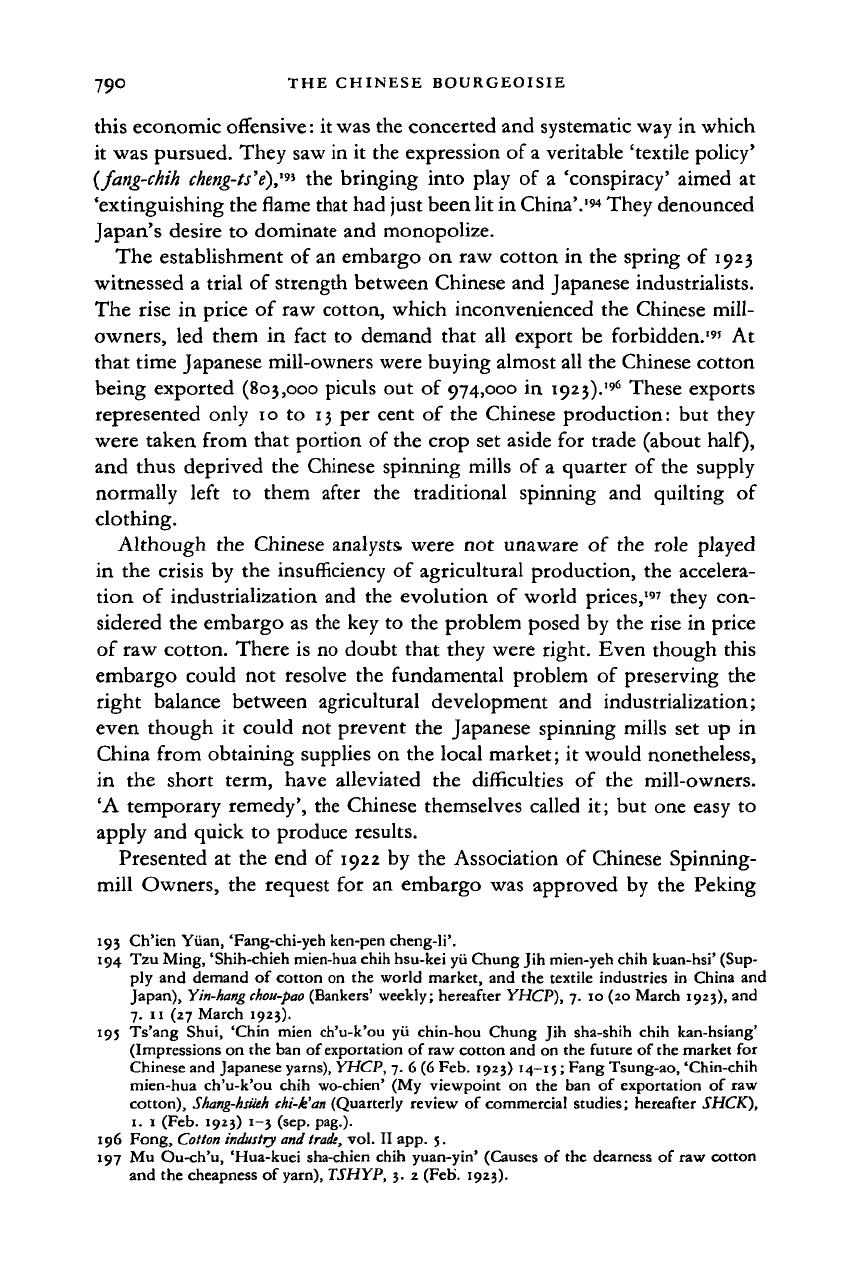
790 THE CHINESE BOURGEOISIE
this economic offensive:
it
was
the
concerted
and
systematic
way in
which
it
was
pursued. They
saw in it the
expression
of
a
veritable 'textile policy'
(fang-chih cheng-ts'e),
m
the
bringing into play
of a
'conspiracy' aimed
at
'extinguishing
the
flame that
had
just been
lit in
China'.'
94
They denounced
Japan's desire
to
dominate
and
monopolize.
The establishment
of an
embargo
on raw
cotton
in the
spring
of
1923
witnessed
a
trial
of
strength between Chinese
and
Japanese industrialists.
The rise
in
price
of
raw
cotton, which inconvenienced
the
Chinese mill-
owners,
led
them
in
fact
to
demand that
all
export
be
forbidden.
1
"
At
that time Japanese mill-owners were buying almost
all the
Chinese cotton
being exported (803,000 piculs
out
of
974,000
in
1923).
196
These exports
represented only
10
to
13 per
cent
of
the
Chinese production:
but
they
were taken from that portion
of the
crop
set
aside
for
trade (about half),
and thus deprived
the
Chinese spinning mills
of a
quarter
of
the
supply
normally left
to
them after
the
traditional spinning
and
quilting
of
clothing.
Although
the
Chinese analysts were
not
unaware
of
the
role played
in
the
crisis
by the
insufficiency
of
agricultural production,
the
accelera-
tion
of
industrialization
and the
evolution
of
world prices,'
97
they
con-
sidered
the
embargo
as the key to the
problem posed
by the
rise
in
price
of
raw
cotton. There
is no
doubt that they were right. Even though this
embargo could
not
resolve
the
fundamental problem
of
preserving
the
right balance between agricultural development
and
industrialization;
even though
it
could
not
prevent
the
Japanese spinning mills
set up
in
China from obtaining supplies
on the
local market;
it
would nonetheless,
in
the
short term, have alleviated
the
difficulties
of
the
mill-owners.
'A temporary remedy',
the
Chinese themselves called
it; but one
easy
to
apply
and
quick
to
produce results.
Presented
at
the end
of
1922 by the
Association
of
Chinese Spinning-
mill Owners,
the
request
for
an
embargo
was
approved
by
the
Peking
193 Ch'ien Yuan, 'Fang-chi-yeh ken-pen cheng-li'.
194 Tzu Ming, 'Shih-chieh mien-hua chih hsu-kei yii Chung Jih mien-yeh chih kuan-hsi' (Sup-
ply
and
demand
of
cotton
on the
world market,
and the
textile industries
in
China and
Japan),
Yin-hang chou-pao
(Bankers' weekly; hereafter YHCP),
7.
10 (20 March 1923), and
7.
11 (27 March 1923).
195 Ts'ang Shui, 'Chin mien ch'u-k'ou
yii
chin-hou Chung
Jih
sha-shih chih kan-hsiang'
(Impressions on the ban of exportation
of
raw cotton and
on
the future
of
the market
for
Chinese and Japanese yarns), YHCP, 7. 6 (6 Feb. 1923)
14-15;
Fang Tsung-ao, 'Chin-chih
mien-hua ch'u-k'ou chih wo-chien' (My viewpoint
on the ban of
exportation
of
raw
cotton),
Shang-hsiieh chi-k'an
(Quarterly review
of
commercial studies; hereafter SHCK),
1.
1 (Feb. 1923)
1-3
(sep. pag.).
196 Fong,
Cotton industry
and
trade,
vol.
II
app.
5.
197
Mu
Ou-ch'u, 'Hua-kuei sha-chien chih yuan-yin' (Causes
of
the dearness
of
raw cotton
and the cheapness
of
yarn), TSHYP, 3.
2
(Feb. 1923).
Cambridge Histories Online © Cambridge University Press, 2008
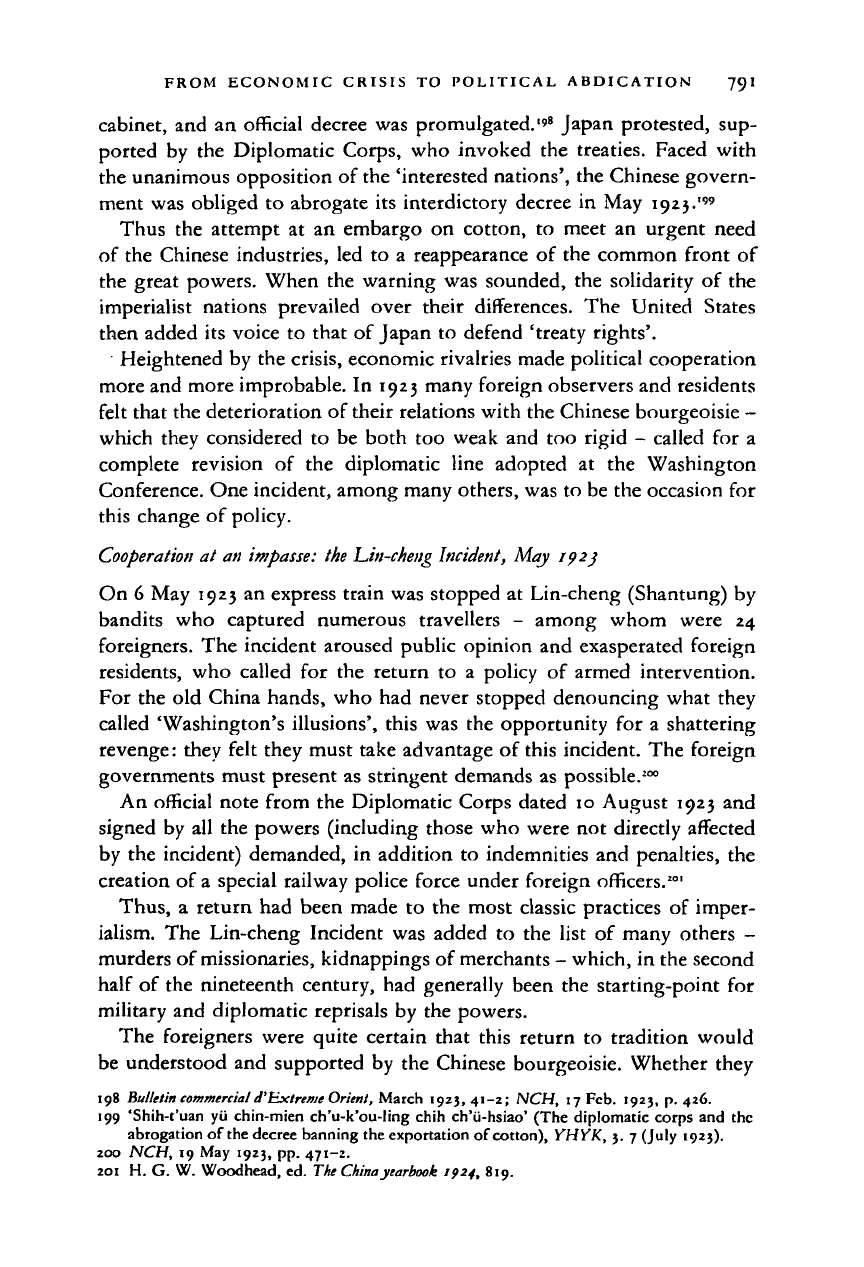
FROM ECONOMIC CRISIS TO POLITICAL ABDICATION 791
cabinet, and an official decree was promulgated.''
8
Japan protested, sup-
ported by the Diplomatic Corps, who invoked the treaties. Faced with
the unanimous opposition of the 'interested nations', the Chinese govern-
ment was obliged to abrogate its interdictory decree in May
1923."
9
Thus the attempt at an embargo on cotton, to meet an urgent need
of the Chinese industries, led to a reappearance of the common front of
the great powers. When the warning was sounded, the solidarity of the
imperialist nations prevailed over their differences. The United States
then added its voice to that of Japan to defend 'treaty rights'.
Heightened by the crisis, economic rivalries made political cooperation
more and more improbable. In 1923 many foreign observers and residents
felt that the deterioration of their relations with the Chinese bourgeoisie -
which they considered to be both too weak and too rigid - called for a
complete revision of the diplomatic line adopted at the Washington
Conference. One incident, among many others, was to be the occasion for
this change of policy.
Cooperation
at an impasse: the
L,in-cheng
Incident, May 192)
On 6 May 1923 an express train was stopped at Lin-cheng (Shantung) by
bandits who captured numerous travellers - among whom were 24
foreigners. The incident aroused public opinion and exasperated foreign
residents, who called for the return to a policy of armed intervention.
For the old China hands, who had never stopped denouncing what they
called 'Washington's illusions', this was the opportunity for a shattering
revenge: they felt they must take advantage of this incident. The foreign
governments must present as stringent demands as possible.
200
An official note from the Diplomatic Corps dated 10 August 1923 and
signed by all the powers (including those who were not directly affected
by the incident) demanded, in addition to indemnities and penalties, the
creation of a special railway police force under foreign officers.
201
Thus,
a return had been made to the most classic practices of imper-
ialism. The Lin-cheng Incident was added to the list of many others -
murders of missionaries, kidnappings of merchants - which, in the second
half of the nineteenth century, had generally been the starting-point for
military and diplomatic reprisals by the powers.
The foreigners were quite certain that this return to tradition would
be understood and supported by the Chinese bourgeoisie. Whether they
198
Bulletin commercial
a"Extreme
Orient,
March 1923, 41-2; NCH, 17 Feb. 1923, p. 426.
199 'Shih-t'uan yii chin-mien ch'u-k'ou-ling chih ch'u-hsiao' (The diplomatic corps and the
abrogation of the decree banning the exportation of cotton),
YHYK,
3. 7 (July 1923).
200 NCH, 19 May 1923, pp. 471-2.
201 H. G. W. Woodhead, ed.
The
China yearbook 1924, 819.
Cambridge Histories Online © Cambridge University Press, 2008
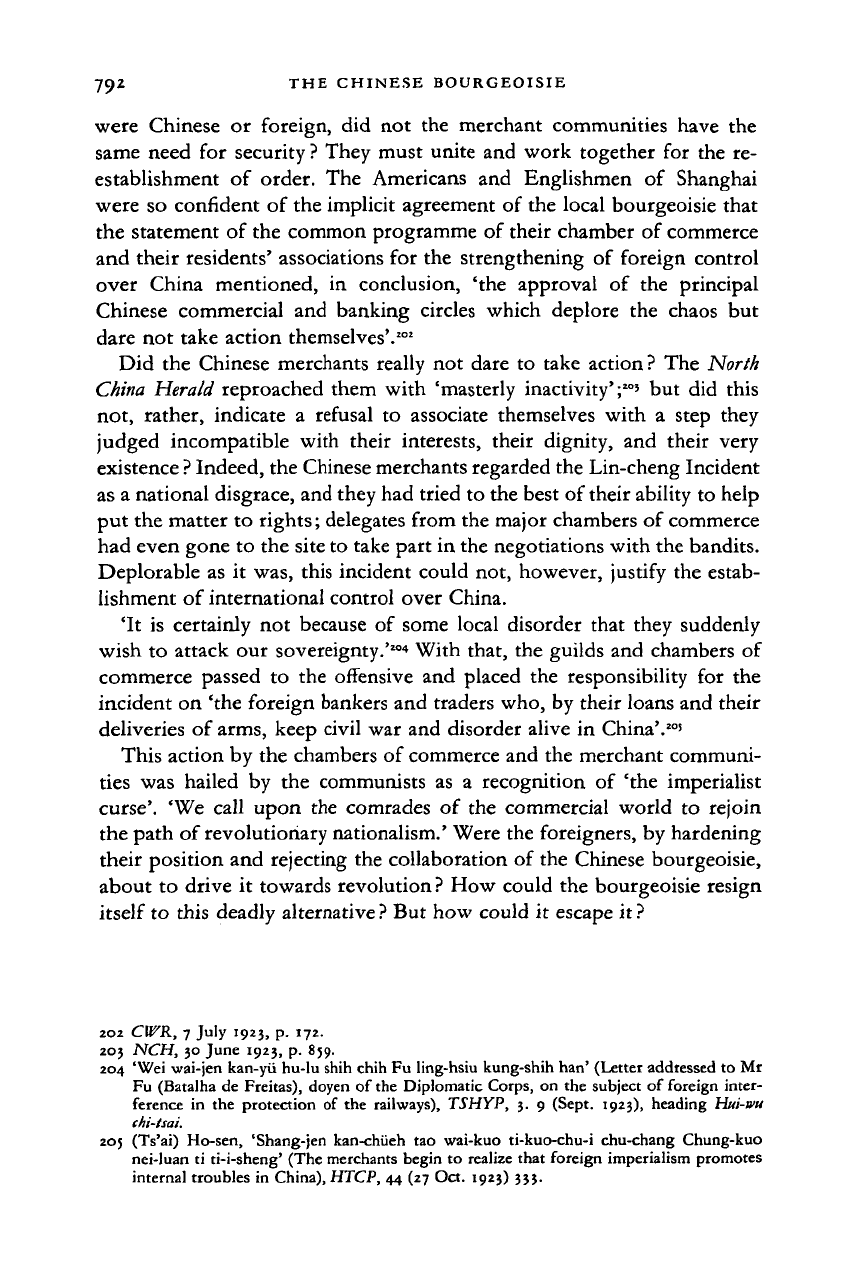
792 THE CHINESE BOURGEOISIE
were Chinese
or
foreign,
did not the
merchant communities have
the
same need
for
security
?
They must unite
and
work together
for the re-
establishment
of
order.
The
Americans
and
Englishmen
of
Shanghai
were
so
confident
of the
implicit agreement
of the
local bourgeoisie that
the statement
of
the
common programme
of
their chamber
of
commerce
and their residents' associations
for the
strengthening
of
foreign control
over China mentioned,
in
conclusion,
'the
approval
of the
principal
Chinese commercial
and
banking circles which deplore
the
chaos
but
dare
not
take action themselves'.
202
Did
the
Chinese merchants really
not
dare
to
take action?
The
North
China Herald reproached them with 'masterly inactivity';
20
'
but did
this
not, rather, indicate
a
refusal
to
associate themselves with
a
step they
judged incompatible with their interests, their dignity,
and
their very
existence
?
Indeed,
the
Chinese merchants regarded the Lin-cheng Incident
as
a
national disgrace, and they had tried
to the
best
of
their ability
to
help
put
the
matter
to
rights; delegates from
the
major chambers
of
commerce
had even gone
to the
site
to
take part
in
the negotiations with
the
bandits.
Deplorable
as
it
was,
this incident could
not,
however, justify
the
estab-
lishment
of
international control over China.
'It
is
certainly
not
because
of
some local disorder that they suddenly
wish
to
attack
our
sovereignty.'
204
With that,
the
guilds
and
chambers
of
commerce passed
to
the
offensive
and
placed
the
responsibility
for
the
incident
on 'the
foreign bankers
and
traders who,
by
their loans
and
their
deliveries
of
arms, keep civil
war and
disorder alive
in
China'.
2O!
This action
by the
chambers
of
commerce
and the
merchant communi-
ties
was
hailed
by the
communists
as a
recognition
of
'the
imperialist
curse'.
'We
call upon
the
comrades
of
the
commercial world
to
rejoin
the path
of
revolutionary nationalism.' Were
the
foreigners,
by
hardening
their position
and
rejecting
the
collaboration
of
the Chinese bourgeoisie,
about
to
drive
it
towards revolution
?
How
could
the
bourgeoisie resign
itself
to
this deadly alternative
?
But how
could
it
escape it
?
202
CWR, 7
July 1923,
p.
172.
203
NCH,
30 June 1923,
p.
859.
204 'Wei wai-jen kan-yii hu-lu shih chih
Fu
ling-hsiu kung-shih han' (Letter addressed
to
Mr
Fu (Batalha
de
Freitas), doyen
of
the Diplomatic Corps,
on the
subject
of
foreign inter-
ference
in the
protection
of the
railways), TSHYP,
3. 9
(Sept. 1923), heading Hui-oiu
chi-tsai.
205 (Ts'ai) Ho-sen, 'Shang-jen kan-chiieh
tao
wai-kuo ti-kuo-chu-i chu-chang Chung-kuo
nei-luan
ti
ti-i-sheng' (The merchants begin
to
realize that foreign imperialism promotes
internal troubles
in
China), HTCP, 44 (27 Oct. 1923) 333.
Cambridge Histories Online © Cambridge University Press, 2008
